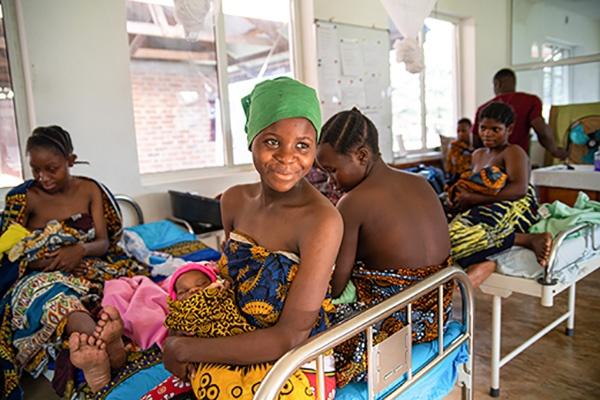health project in tanzania
Improving the reproductive and sexual health of adolescents
In 2021, Tanzania had a population of 61 million people of whom almost a quarter were adolescents aged 10 to 19, that is 15.5 million young people. The well-being of this age group is closely linked to their sexual and reproductive health. And yet among the sexually active adolescents, only half of them used a condom the last time they had sexual intercourse*. As a result, in some rural areas 39% of adolescent girls aged 15 to 19 already have a child or are pregnant**. They run an increased risk of premature birth, complications during childbirth and maternal and neonatal mortality.
Partnership of 2 Swiss NGOs with complementary specialised skills
Enfants du Monde, recognised for its expertise in education for over 50 years, and the NGO SolidarMed, specialist in the medical sector, launched a joint project in 2022 funded by the Swiss Agency for Development and Cooperation, to improve the sexual health of adolescents aged 10 to 19 in the district of Ulanga in the south of the country. Changing the attitudes of adolescents and adapting health services to their needs lies at the heart of this project, the first stage in closer cooperation between the two NGOs.
Lasting results between now and 2024
Objectives for this project between 2022 and 2024 :
- Improve the knowledge of nearly 15,000 adolescents aged 10 to 19 and encourage a positive attitude to issues of sexuality, contraception, and pregnancy
- Change the attitude of around 100 adults from school or medical environments so they can support young people if problems related to these issues arise
- Improve the availability and quality of reproductive and sexual health services in Ulanga district
Improving health through education
 © Roshni Lodhia / SolidarMed / FairpictureAdolescents in Tanzania often lack information on issues related to sexuality, contraception, and pregnancy. Sex education is almost non-existent: girls for example do not realise they can fall pregnant the first time they have sexual intercourse; contraception use is minimal.
© Roshni Lodhia / SolidarMed / FairpictureAdolescents in Tanzania often lack information on issues related to sexuality, contraception, and pregnancy. Sex education is almost non-existent: girls for example do not realise they can fall pregnant the first time they have sexual intercourse; contraception use is minimal.
This project aims to improve the knowledge of nearly 15,000 adolescents. Appropriate sex education will help reduce sexually transmitted infections and the number of unwanted pregnancies***. Switzerland is one of the countries with the fewest teenage pregnancies in the world, and this is because sex education has formed part of the school curriculum for many years.
Encouraging the engagement of young people in order to change attitudes
To identify the needs of young people as well as the restrictions and taboos related to sexuality, Enfants du Monde will first conduct interviews in the local language with adolescents, educators, parents, teachers and the village community.
Based on analysis of these interviews, our education specialists, working alongside the training team in Tanzania, will develop an educational guide for facilitators and will train them in participatory approaches so they can engage young people, for example by producing radio broadcasts or educational plays. This approach will have considerable impact on health education sessions.
Offering health services tailored to adolescents
In the rural district of Ulanga, the region’s hospital is the only one to provide reproductive and sexual health services, in an environment which is not tailored to adolescent needs. In the other 23 clinics in the area, the lack of trained healthcare staff, restricted opening hours, the limited choice in family planning methods, or just being unaware of their existence, result in limited access to these services for young people.
For this reason our partner SolidarMed will put in place measures aiming to tailor health centre services to the needs of young people – for example by making available dedicated ‘closed door’ consultation rooms, or by flexible consultation hours, and by strengthening the competences of healthcare staff so they can offer a broader range of services, family planning or screening for sexually transmissible diseases.
Sources:
*Kalolo A, Kibusi SM. The influence of perceived behaviour control, attitude and empowerment on re-ported condom use and intention to use condoms among adolescents in rural Tanzania. Reprod Health. 2015 Nov 13;12:105. doi: 10.1186/s12978-015-0097-5. PMID: 26563296; PMCID: PMC4643513.
**Teenage childbearing by region, UNFPA Teenage pregnancies factsheet 2018
***Rapport de l’UNESCO de 2015 intitulé « L’éducation sexuelle complète : Nouvelles données, leçons et pratiques – Étude mondiale 2015 »
